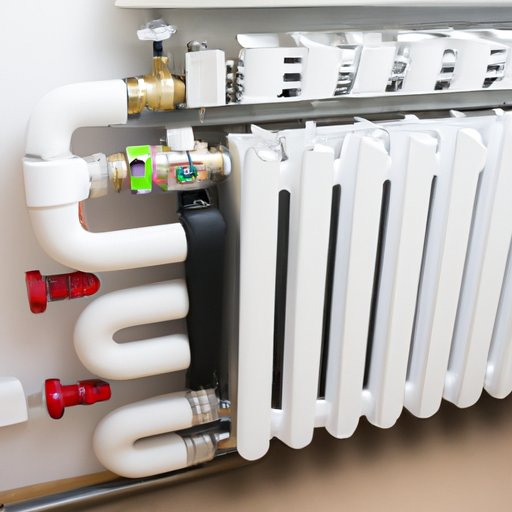Introduction
Hydronic heating is a type of central heating that uses water as a medium to transfer heat throughout the home. The system consists of a boiler or hot water heater, pump, expansion tank, and piping network. It can be used to heat the entire house or specific rooms, depending on the size and layout of the home.
Hydronic heating systems are becoming increasingly popular due to their many advantages, including energy efficiency, cost savings, and comfort and convenience. In this article, we will explore the ins and outs of hydronic heating and how it can benefit you and your home.

Exploring Hydronic Heating: A Comprehensive Guide
Let’s start by taking a closer look at the different types of hydronic heating systems and their components.
Types of Hydronic Heating Systems
There are two main types of hydronic heating systems: radiant floor heating and baseboard heating. Radiant floor heating involves running pipes underneath the floor to create an even, consistent heat. Baseboard heating, on the other hand, involves running pipes along the walls to provide localized heat.
Components of a Hydronic System
The three main components of a hydronic heating system are the boiler, pump, and expansion tank. The boiler is responsible for producing hot water, which is then circulated through the pipes by the pump. The expansion tank is used to control the pressure in the system and prevent damage to the pipes.
How Hydronic Heating Works
When the thermostat is set to a certain temperature, the boiler will turn on and start heating the water. The pump then circulates the heated water through the pipes to the various parts of the home. As the water passes through the pipes, it releases heat, which warms up the air in the room. The cooled water is then returned to the boiler, where it is reheated and sent back through the pipes.
Benefits of Installing a Hydronic Heating System
Now that you know how hydronic heating works, let’s take a look at some of the benefits it offers.
Energy Efficiency
One of the biggest advantages of hydronic heating is its energy efficiency. Because water has a higher heat capacity than air, it takes less energy to heat it. This means that hydronic heating systems use less energy overall, which translates into lower energy bills.
Cost Savings
In addition to being more energy efficient, hydronic heating systems also offer significant cost savings over traditional heating systems. The initial installation costs may be higher, but the long-term savings make it worth the investment.
Comfort and Convenience
Hydronic heating systems are known for their comfort and convenience. They provide a steady, even heat that is more comfortable than forced-air systems. They are also quieter and require less maintenance.

How to Choose the Right Hydronic Heating System for Your Home
When it comes to choosing the right hydronic heating system for your home, there are several factors to consider.
Consider Your Home’s Needs
The first thing to consider is your home’s needs. Think about the size and layout of your home and how many rooms you want to heat. You should also consider the climate you live in, as this can affect the type of system you need.
Consider the Size and Layout of Your Home
The size and layout of your home can also play a role in determining the type of hydronic heating system you need. For example, if you have a large home with multiple floors, you may need a larger system to adequately heat all the rooms.
Consider the Climate You Live In
The climate you live in can also affect your choice of hydronic heating system. If you live in a colder climate, you may need a more powerful system to keep your home warm during the winter months. On the other hand, if you live in a warmer climate, you may be able to get away with a smaller system.

Comparing Traditional and Hydronic Heating Systems
The next step is to compare traditional and hydronic heating systems so you can make an informed decision. Let’s take a look at the advantages of each.
Advantages of Traditional Heating Systems
Traditional heating systems, such as furnaces and boilers, are less expensive to install and easier to maintain. They are also better suited for larger homes that require more powerful heating systems.
Advantages of Hydronic Heating Systems
Hydronic heating systems are more energy efficient and offer greater comfort and convenience. They are also quieter and require less maintenance. Additionally, they are better suited for smaller homes and those with complex layouts.
A Beginner’s Guide to Maintaining Hydronic Heating Systems
Once you’ve decided on a hydronic heating system, it’s important to know how to maintain it. Here are some tips for keeping your system in top condition.
Regular Maintenance and Inspections
It’s important to have your hydronic heating system inspected and serviced regularly by a qualified technician. Regular maintenance and inspections can help identify any potential problems and ensure your system is operating at peak efficiency.
Troubleshooting Common Issues
If you encounter any issues with your hydronic heating system, it’s best to contact a professional for help. They can diagnose the problem and suggest solutions to get your system back up and running.
Tips for Saving Energy
Finally, there are a few simple steps you can take to save energy with your hydronic heating system. For instance, you can adjust the thermostat and use timers to only heat specific areas when needed. Additionally, you can add insulation to your home to reduce heat loss.
Conclusion
Hydronic heating systems offer many benefits, including energy efficiency, cost savings, and comfort and convenience. They are also easy to maintain and can be tailored to fit the needs of any home. With the right system and regular maintenance, you can enjoy the benefits of hydronic heating for years to come.


